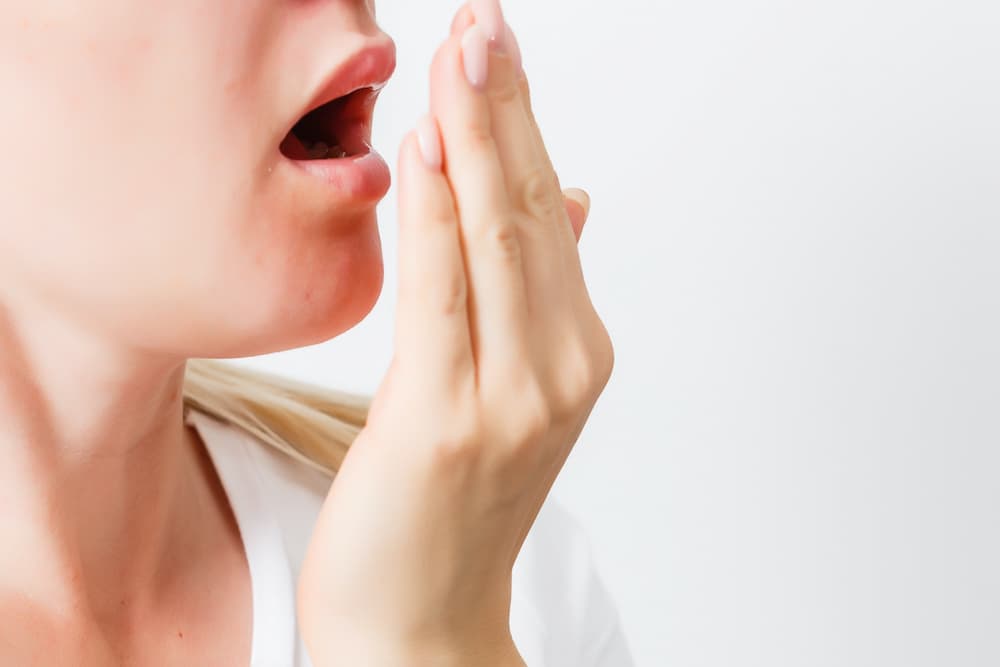Halitosis, better known as bad breath, is pretty common. However, most people don’t have a clear idea of what causes bad breath. A lack of good oral hygiene is a common reason behind bad breath, while some foods can lead to temporary symptoms of halitosis. However, there are a multitude of medical conditions that can potentially trigger bad breath in people who take their oral health seriously.
An easy way to avoid halitosis is to ensure you’re seeing your dentist for regular checkups. Looking for an experienced dentist in Cork to help with these issues? At Bandon Dental, we’re here to help ensure the horrors of halitosis aren’t holding you back.
What is Halitosis?

Just about everyone experiences bad breath at some point or other, with most of us waking up with a case of it in the morning. However, there’s a difference between bad breath that’s the result of post-slumber dry mouth and chronic halitosis.
“Sufferers of chronic halitosis will usually struggle to find a solution for how to get rid of bad breath through conventional means,” Deirdre Dunne says, a dental hygienist. “If no amount of brushing, flossing, or rinsing with mouthwash for bad breath curbs the problem, it might be a sign that something more serious is going on.”
According to the Dental Health Foundation of Ireland, studies have shown that up to 50% of adults suffer from halitosis. To settle on an effective halitosis treatment plan, you first need to understand what’s causing it. This isn’t always an easy process, with numerous bad breath causes that will need to be ruled out.
Halitosis can be potentially connected with a wide variety of ailments and diseases. Therefore, you may need to consult a doctor as well as your dentist. Your healthcare provider will be able to talk to you about what causes halitosis and rule out any medical issues that might be triggering your symptoms.
What Causes Bad Breath (Halitosis)?
Many people don’t realise they’re suffering from halitosis until the issue is flagged by someone else. While this can be embarrassing, it’s important to know so you can do something about it.
Finding out what causes bad breath is the first step in getting rid of halitosis for good. Most cases of halitosis are caused by a lack of proper oral hygiene. Sometimes, brushing and flossing alone isn’t enough to combat the bacteria that thrive inside the mouth. If you’re not attending dentist appointments regularly and scheduling regular sessions with a dental hygienist, you’re putting your oral health at risk.
If left unchecked, the bacteria found in the mouth can multiply, causing the foul odour of halitosis. Sadly, this is just the start. Over time, cavities can form and gum disease can set in. However oral hygiene shortfalls aren’t the only cause of bad breath.
Don’t Rule Out Dry Mouth
Sometimes, our bodies don’t produce enough saliva. During the night, saliva production winds down slightly while we sleep, which usually causes dry mouth and bad breath in the morning. However, sustained drops in salivary production can trigger halitosis. There are several risk factors associated with dry mouth. If you’re a smoker, you’ll tend to find that your mouth is dry more frequently. Other people experience dry mouth after taking prescribed medications. Another common cause in otherwise healthy individuals is dehydration.
Digestive Disorders
Issues like gastro-oesophageal reflux disease (GORD) are increasingly common. In the western hemisphere, up to 25% of adults are thought to suffer from GORD. How does this cause bad breath? “When fluids and acids from the stomach are forced back into your oesophagus, a distinct odour almost always accompanies it. Eliminating bad breath from stomach complaints is therefore one thing you’ll want to do before considering other causes,” Deirdre Dunne said.
Gingivitis and Periodontitis
Inflammatory oral diseases like gingivitis and periodontitis are common. Inflamed gums are not only painful, but they can also eventually lead to bleeding when brushing. If gingivitis is left unchecked, it can develop into the more serious condition, periodontitis. It’s this disease that leads to permanent damage to the gum tissue and eventual tooth loss.
A recent report published in Dentistry Journal found that up to 70% of adults in the Western world were affected by periodontitis. Bad breath is to be expected when suffering from either disease. In the case of gingivitis, halitosis is often a warning sign.
Diabetes and Dry Mouth
Those suffering from diabetes face a greater risk of developing gum disease. Along with bad breath, gum disease can harm blood sugar levels. This can make treatment plans ineffective when dealing with diabetes.
Other Diseases That Can Cause Dry Mouth
Halitosis is often a late-stage symptom of diseases of the liver and kidneys. In a healthy individual, these organs filter out harmful toxins. However, when they’re compromised by disease, these toxins are allowed to build up. Over time, this can lead to halitosis.
What’s more, many autoimmune diseases present many problematic symptoms for sufferers. One of them is dry mouth, which can quickly result in halitosis.
Oral Cancers
Cancer can affect every part of the mouth. Cancers of the larynx, salivary glands and oral cavity itself are all becoming increasingly common. While most oral cancers have a fairly high survival rate, early detection is crucial. Along with painful sores and unexplained weight loss, bad breath might be an early warning sign that something very wrong is happening inside your mouth. It’s worth getting an oral cancer screening if you feel this might be the issue.
Halitosis Treatment
Once you’ve established what causes bad breath, you can start doing something about it. Seeing your dentist regularly is recommended will pre-empt a lot of the problems that lead to halitosis. The Irish Dental Association suggests seeing your dentist at least once a year. However, you should be aiming to have your teeth cleaned with a hygienist once every four to six months.
Your dentist will be able to advise you on the best treatment to control your symptoms. We’ve outlined some of the most common below.
Specialist Toothpaste and Mouth Wash
If your halitosis is merely the result of plaque building up, a high-performance mouthwash might be enough to combat the problem. Sometimes, antibacterial toothpaste may also be prescribed. When brushing your teeth, make sure you’re not applying too much pressure. If your gums bleed after brushing, you’re only going to make those halitosis symptoms worse.
Lifestyle Changes

If you’re a smoker, eliminating bad breath is just one of many reasons to consider ditching the habit. You should also aim to remove as many sugary drinks and foods from your diet as possible, as both can encourage bacteria in the mouth to multiply.
Treatment of Other Diseases
Have you been suffering from acid reflux for a while? The Health Service Executive (HSE) recommends seeing a GP if your heartburn symptoms last for three weeks or more. If you discover that you’re a GORD sufferer, your treatment for that issue should eventually resolve bad breath symptoms.
If your dentist suspects that your halitosis is the result of another medical problem, they may choose to refer you to your doctor for further examination. From there, you’ll be able to discuss the next steps.
Taking Care of Halitosis
Although poor oral hygiene can be a cause of bad breath, this isn’t always the case. Many people who brush twice a day and floss regularly will experience halitosis, which is why it’s so important to visit your dentist regularly to uncover the true cause of the problem.
Frequent trips to the dentist will ensure common gum diseases like gingivitis aren’t allowed to take hold. If gingivitis is present or has progressed to periodontitis, your dental team will suggest a treatment plan to resolve the problem and alleviate halitosis.
It’s important to take bad breath seriously. As well as alerting you to problems with your oral health, it can also be a sign that things aren’t working as they should elsewhere in the body.
Find Out What’s Causing Your Bad Breath
Are you suffering from bad breath? Don’t let halitosis hinder your ambitions or social life any longer. At Bandon Dental, our team of experienced oral care providers will identify the root cause of your problem. Once uncovered, our team will talk you through all your treatment options.
Searching for more dental services? Talk to us about orthodontics, Invisalign and teeth whitening. Are you in between appointments? Why not schedule a scale and polish? Use the online form to get in touch today, or call us at (023) 884 1752.

